AMD Zen 4 Ryzen 9 7950X and Ryzen 5 7600X Review: Retaking The High-End
by Ryan Smith & Gavin Bonshor on September 26, 2022 9:00 AM ESTGaming Performance: 720p and Lower
All of our game testing results, including other resolutions, can be found in our benchmark database: www.anandtech.com/bench. All gaming tests here were run using a variation of 720p resolutions and at minimum settings.
We are using DDR5 memory on the Ryzen 9 7950X and Ryzen 5 7600X, as well as Intel's 12th Gen (Alder Lake) processors at the following settings:
- DDR5-5200 CL44 - Ryzen 7000
- DDR5-4800 (B) CL40 - Intel 12th Gen
All other CPUs such as Ryzen 5000 and 3000 were tested at the relevant JEDEC settings as per the processor's individual memory support with DDR4.
Civilization VI
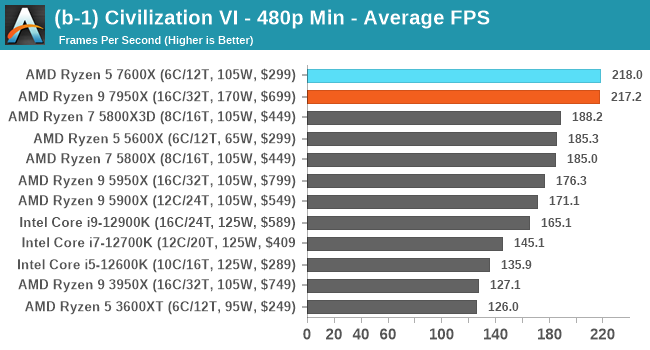
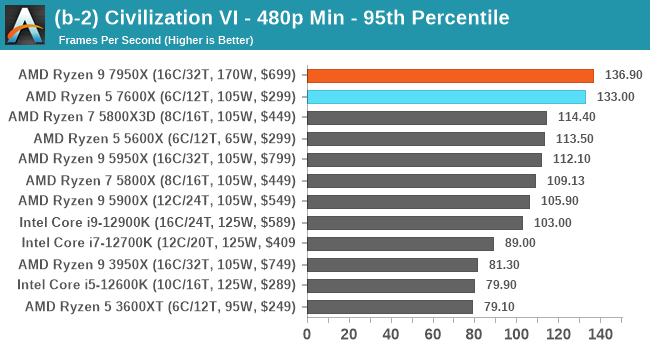
World of Tanks
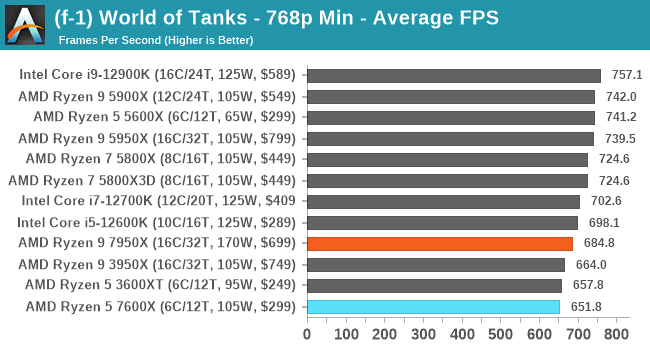
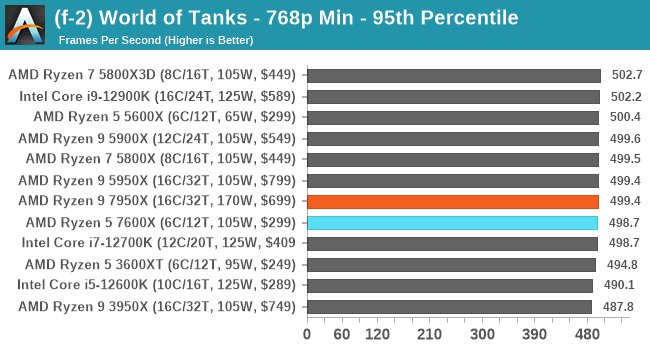
Borderlands 3
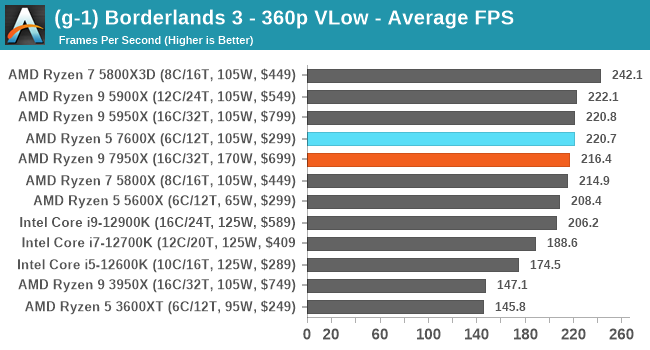
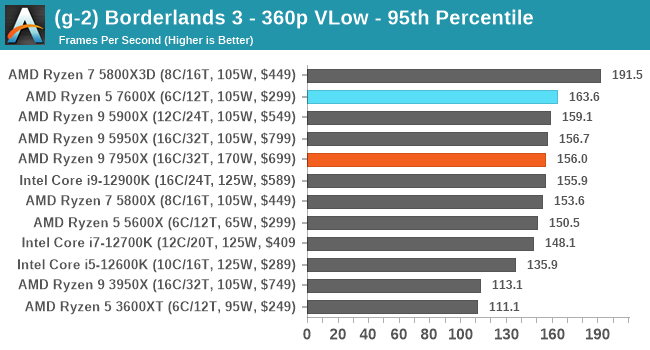
Far Cry 5
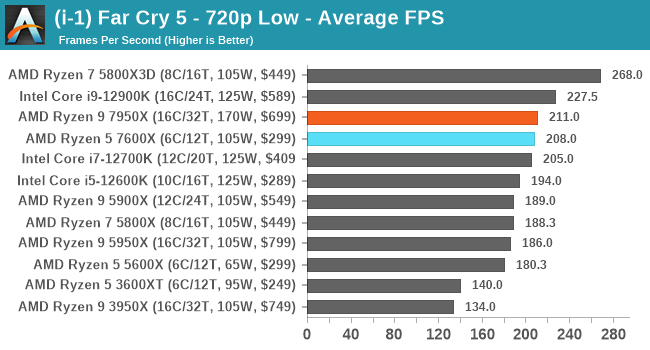
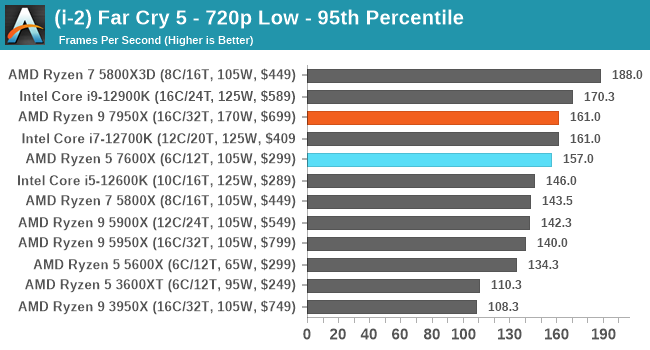
Grand Theft Auto V
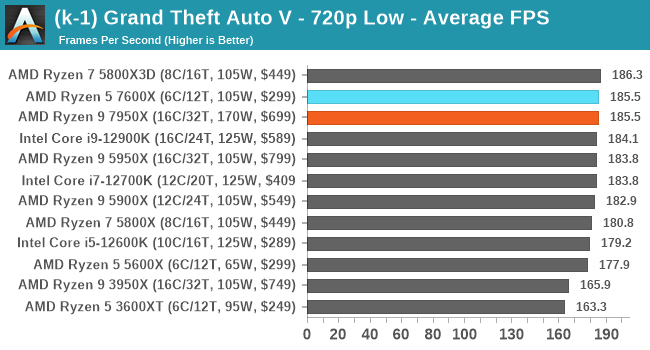
~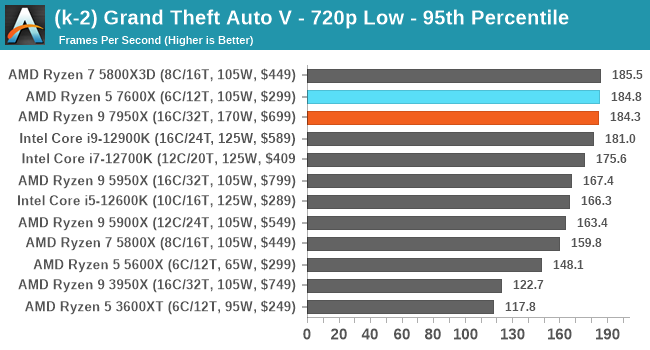
Red Dead Redemption 2
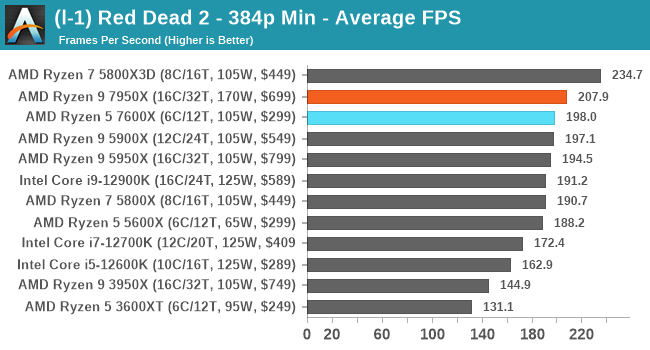
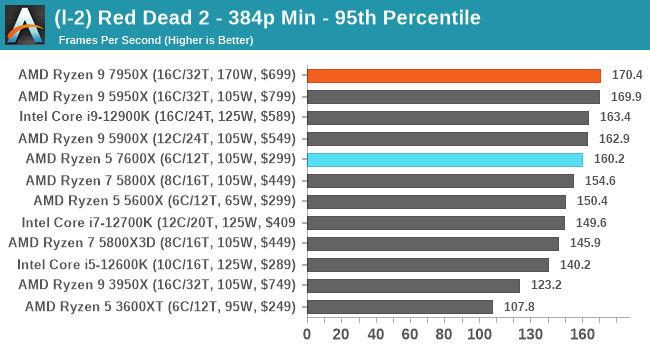
Strange Brigade (DirectX 12)
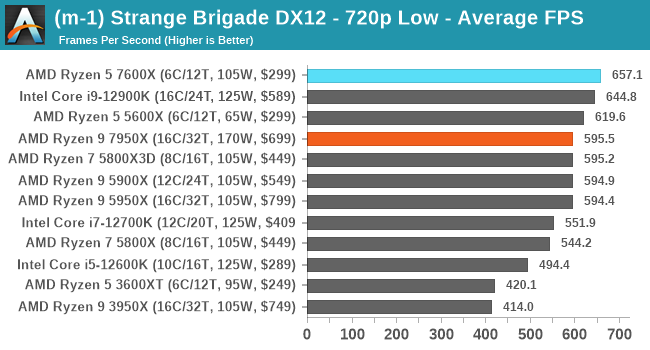
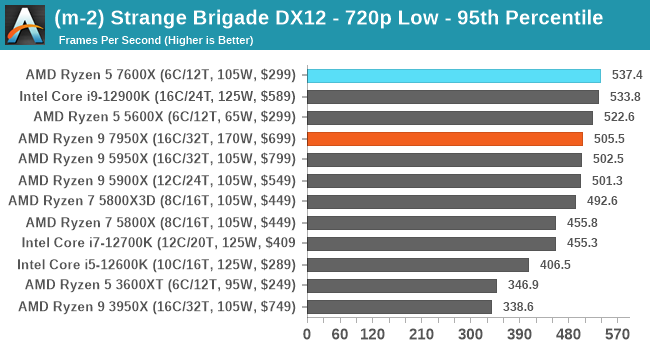
Strange Brigade (Vulcan)
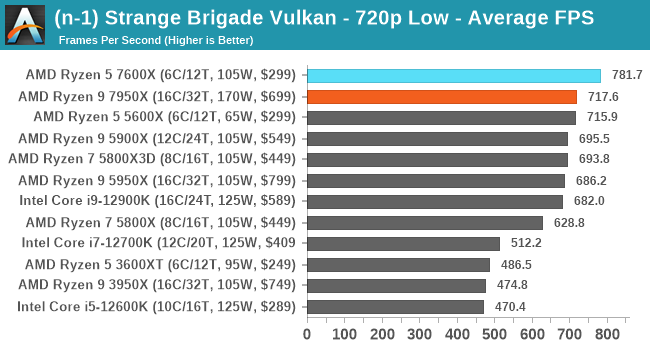
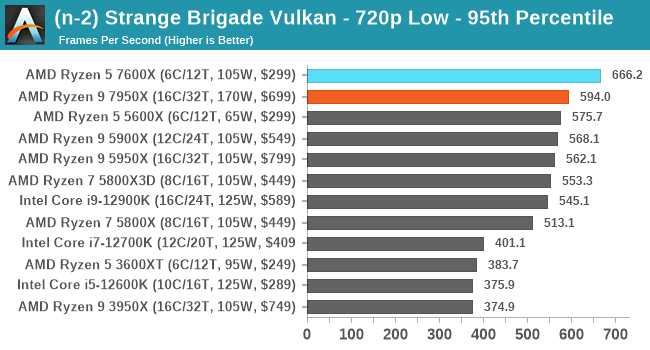
When it comes to gaming at lower resolutions such as 720p and 480p, there are more frames for the processor to, well, process, so this is where the CPU can show its limitations more so as opposed to GPU. In Civilization VI at 480p, we see the Ryzen 7950X and 7600X decimate the competition by around 15%.
What's interesting is that in some of our titles including Strange Brigade and Grand Theft Auto V, at least when using lower resolutions, the Ryzen 5 actually out performs its more expensive Ryzen 9 counterpart.










205 Comments
View All Comments
AndrewJacksonZA - Monday, September 26, 2022 - link
I would imagine it's a technically correct way of saying that it's certified for Windows 11. See here about the TPM:www DOT microsoft DOT com/security/blog/2020/11/17/meet-the-microsoft-pluton-processor-the-security-chip-designed-for-the-future-of-windows-pcs/ Reply
socket420 - Monday, September 26, 2022 - link
I'm primarily asking whether or not the Pluton security coprocessor has been incorporated into Raphael/Ryzen 7000 CPUs, and I'm pretty sure that isn't what they were implying - Microsoft *does* have a "secured-core PC" baseline for Win11 they've been pushing lately, but it's currently unclear how Pluton ties into that so I don't think Win11 "certification" has anything to do with it. Pluton wasn't mentioned in AMD's desktop Ryzen 7000 press release last month, I didn't see it in any of the Zen 4 architectural slides they showed off today and AnandTech is the only outlet that's brought it up at all, which is why I'm asking this question in the first place - AMD hasn't been particularly forthcoming about the subject and I feel like they would've mentioned Pluton in a press release if it was actually present in these chips. ReplyRyan Smith - Monday, September 26, 2022 - link
I am not privy to the implementation details. But like other parts of the IOD, Pluton is inherited from the Ryzen 6000 Mobile parts. So it has the same Pluton implementation as those mobile chips.TL;DR: I don't know how they're technically accomplishing it, but yes, Pluton is there and enabled. Reply
socket420 - Tuesday, September 27, 2022 - link
Thanks for the response. Just to clarify, if I reread that section correctly, the Ryzen 7000 I/O die is a new design that had most of the additions from Ryzen 6000 ported over to it, Pluton included. That sounds incredibly damning, but I'm not sure how it's possible to confirm its presence without implementation details. I'm also unsure why AMD would brag about Pluton being present in two different mobile CPU releases from the moment they were announced while seemingly ignoring it in their new and shiny desktop Ryzen lineup up until its release date (are they hoping we won't notice?), but then again, it's been months since Ryzen 6000 was launched and no one's taken a closer look at its Pluton implementation yet, so :/IIRC, Lenovo ships their Ryzen 6000 Thinkpads with Pluton disabled and you have to go into their BIOS to toggle it on or off, so maybe that option showing up on consumer AM5 boards will show us if Pluton's there or not? It'd also be cool if someone asked AMD directly for a response, but Robert Hallock said he "didn't know" if Pluton was in Zen 4 and he coincidentally just left the company, so I have no idea who to reach out to. Reply
Silver5urfer - Tuesday, September 27, 2022 - link
Thanks for your question and this new garbage Pluton cancer is what I did not want to see shame how they added it. ReplyOxford Guy - Tuesday, September 27, 2022 - link
You will own nothing and be owned by everything. You will be happy. ReplyValantar - Monday, September 26, 2022 - link
Could you please run your per-core power draw tests for these chips like you did for Zen3? Replytakling1986 - Monday, September 26, 2022 - link
I think this review is "streets ahead". ReplyIBM760XL - Monday, September 26, 2022 - link
All right, since they aren't read yet, I'll ask... is it easy to set a lower TDP limit, and could you examine power efficiency when the TDP is the same as it was for Ryzen 5000?Looking at the numbers Tom's Hardware posted, the 7950X uses about 80W more at load than the 5950X. With AMD's own slides touting the efficiency improvements being greater at lower TDPs, what I'd really like is to have an octo-core at 65W like the 5700, or perhaps a 12/16 core at 105W like the 5900/5950.
Though I'm very likely to wait until B650 drops before making a decision, so there's plenty of time for an answer to that question to arrive. Reply
abufrejoval - Wednesday, September 28, 2022 - link
I can only guess that it should be trival to do via RyzenMaster, just in case it's not supported in the BIOS. And of course I'd demand CLI tools for both Linux and Windows.I cannot imagine that with a max TDP of 140 Watts a 7950X won't still be faster than a 5950X, even if it won't be quite as fast as if you let it drain the bottle at full hilt. The typical CMOS knee will still be there, only moved forward a bit and with a lot more of a "hot leg" showing towards the top.
But gains per clock and Watt will be terrible the higher you go on the "hot leg" by nature of silicon physics and any sensible person will just use a "lesser cooler" to avoid that nonsense. Reply